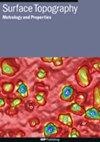All-laser route for anti-fouling superhydrophobic albronze fabrication and non-contact microbial detection
IF 2
3区 材料科学
Q2 ENGINEERING, MECHANICAL
引用次数: 0
Abstract
Biofouling leading to clog is one of the severe issues underwater valve components are facing today. Establishing a superhydrophobic barrier against microorganisms for underwater albronze components is hence of great significance. We demonstrate an all-laser route for superhydrophobic albronze surface fabrication and non-contact microbial diagnostics. Laser-textured albronze surfaces with well-defined periodic valleys and crests exhibit excellent superhydrophobicity with a contact angle up to 151 ± 1° and a contact angle hysteresis of 0.9 ± 0.1°, more than twice that of an original albronze surface (66 ± 2°). The theoretical wettability diagram of water droplets on laser-textured albronze surfaces shows that the surface wettability transits from hydrophilicity towards hydrophobicity as the surface undulation level elevated, matching well with the experimental observation. According to surface chemistry analysis, carbonyl groups on the albronze surfaces are extensively eliminated by laser texturing and vacuum heating treatment, which contributes to the wettability transformation. The anti-fouling performance of the laser-textured albronze surfaces was comparatively studied in chalk ash aqueous solution, starch solution, and microbial suspension, respectively. Laser-induced breakdown spectroscopy was applied for non-contact microbial diagnostics. Greatly enhanced resistance to biofouling on laser-textured albronze surfaces was confirmed. An all-laser route for anti-fouling superhydrophobic albronze surface fabrication and non-contact microbial diagnostics show great promise for next-generation underwater equipment upgrade and on-site monitoring.用于防污超疏水铝青铜制造和非接触微生物检测的全激光路线
生物污染导致的堵塞是当今水下阀门部件面临的严重问题之一。因此,为水下铝青铜组分建立防微生物的超疏水屏障具有重要意义。我们展示了超疏水铝青铜表面制造和非接触微生物诊断的全激光路线。具有明确周期谷和波峰的激光织构albronze表面表现出优异的超疏水性,接触角高达151±1°,接触角迟滞为0.9±0.1°,是原始albronze表面(66±2°)的两倍多。激光织合albronze表面水滴的理论润湿性图表明,随着表面波动水平的升高,表面润湿性由亲水性向疏水性过渡,与实验观察结果吻合较好。表面化学分析表明,激光织构和真空热处理使铝青铜表面的羰基大量消除,有利于润湿性转变。分别在白垩灰水溶液、淀粉溶液和微生物悬浮液中比较研究了激光纹理albronze表面的防污性能。应用激光诱导击穿光谱法进行非接触微生物诊断。激光加工的铝青铜表面的抗生物污染能力得到了极大的增强。一种用于防污超疏水铝青铜表面加工和非接触式微生物诊断的全激光工艺为下一代水下设备升级和现场监测提供了巨大的前景。
本文章由计算机程序翻译,如有差异,请以英文原文为准。
求助全文
约1分钟内获得全文
求助全文
来源期刊

Surface Topography: Metrology and Properties
Materials Science-Materials Chemistry
CiteScore
4.10
自引率
22.20%
发文量
183
期刊介绍:
An international forum for academics, industrialists and engineers to publish the latest research in surface topography measurement and characterisation, instrumentation development and the properties of surfaces.
 求助内容:
求助内容: 应助结果提醒方式:
应助结果提醒方式:


